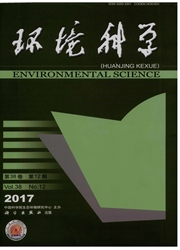

 中文摘要:
中文摘要:
以1株对三苯基锡(triphenyltin,TPT)有高耐受性的球形红假单胞菌(Rhodopseudomonos spheroids)X-5为对象,进行TPT的微生物降解实验,研究了R.spheroids对TPT降解特性.结果表明,R.spheroids对TPT有良好降解效果.30℃是其最佳生长温度,对TPT的降解活性最大.干重为0.49 g·L^-1的湿菌体,在3h内对TPT的降解率为13.82%~47.29%.在双蒸水、人工海水、培养基和江水等不同的降解介质中进行的实验表明,天然江水最利于菌体对TPT的降解,江水中的土著微生物对其降解TPT具有协同作用.R.spheroids对TPT的降解过程主要是通过菌体快速吸附,TPT进入细胞内,靠胞内酶进行初步降解,之后菌体细胞将TPT及其中间产物返回到细胞外,靠胞外酶进一步降解,24 h内菌体产生的胞外酶对TPT的降解达到71.64%.
 英文摘要:
英文摘要:
The biodegradation of triphenyltin(TPT) by Rhodopseudomonos spheroids was investigated in this study.The results illuminated that R.spheroids was an effective strain for the biodegradation of TPT.The maximum removal ratio was attained when the growth temperature of R.spheroids was 30℃.After treating for 3 hours,the removal ratios of 3 mg·L^-1 TPT were 13.82% to 47.29% using 0.49 g·L^-1(based on dry weight) biomass of R.spheroids.The experiments on biodegradation of TPT were carried out in double-distilled water,simulated seawater,culture medium and river water,respectively.The results demonstrated that river water was optimal for the biodegradation since the indigenous microorganisms in water synergistically increased the removal ratios of TPT.Extracellular enzyme produced by R.spheroids was also effective on the degradation of TPT,and 71.64% of TPT was degraded by this way within 24 hours.The experiments also revealed that the biodegradation process of TPT included biosorption by cell wall,TPT entering cells,and initial degradation by intracellular enzyme,then the TPT and intermediate products backing out of cells to be degraded by extracellular enzyme.
 同期刊论文项目
同期刊论文项目
 同项目期刊论文
同项目期刊论文
 Alteration of Heavy Metal Fractions in Soil of Guiyu, South China by Native Bacillus cereus under th
Alteration of Heavy Metal Fractions in Soil of Guiyu, South China by Native Bacillus cereus under th Polycyclic aromatic hydrocarbons on indoor/outdoor glass window surfaces in Guangzhou and Hong Kong,
Polycyclic aromatic hydrocarbons on indoor/outdoor glass window surfaces in Guangzhou and Hong Kong, Characteristics of copper removal and ion release during copper biosorption by Stenotrophomonas malt
Characteristics of copper removal and ion release during copper biosorption by Stenotrophomonas malt 期刊信息
期刊信息
